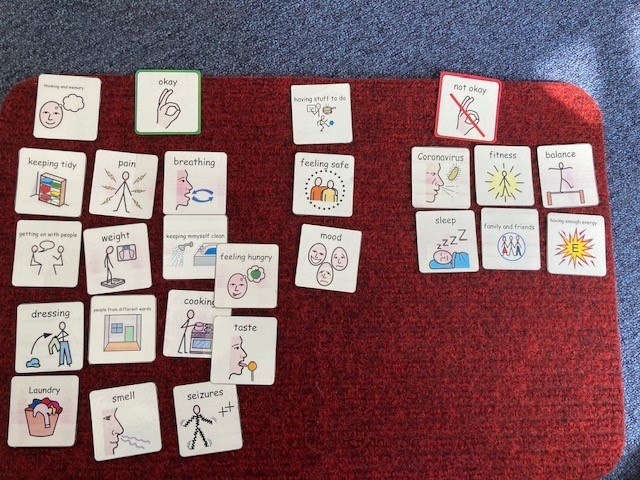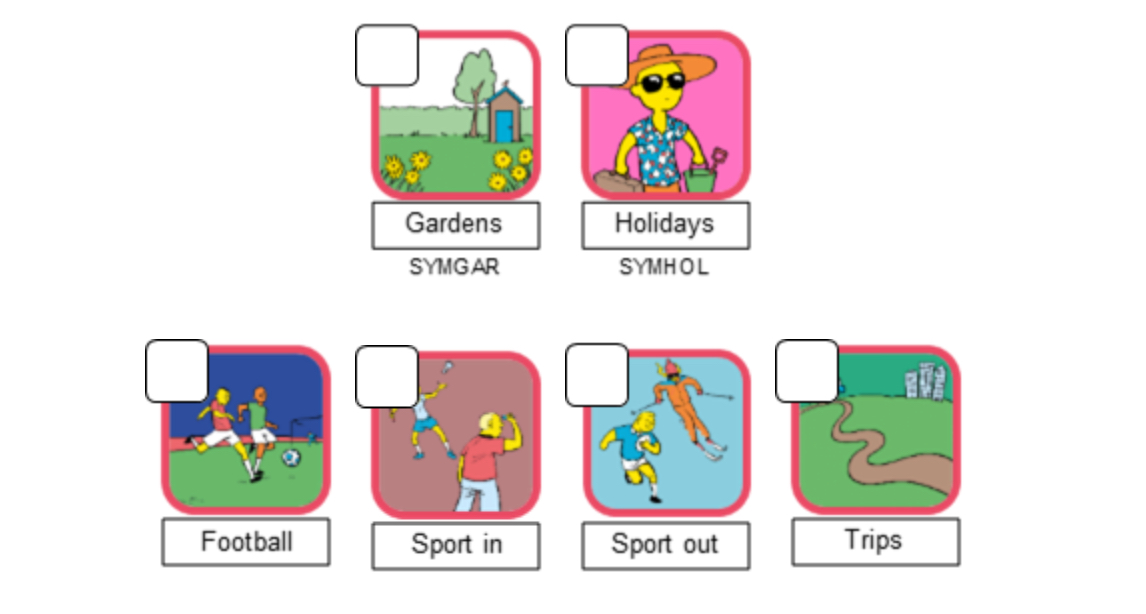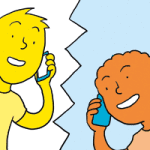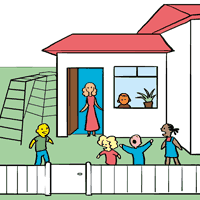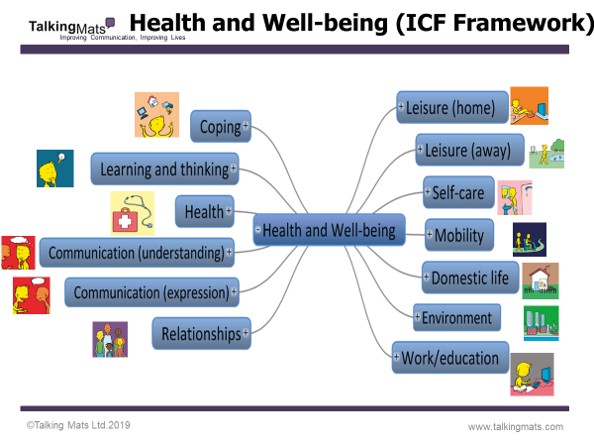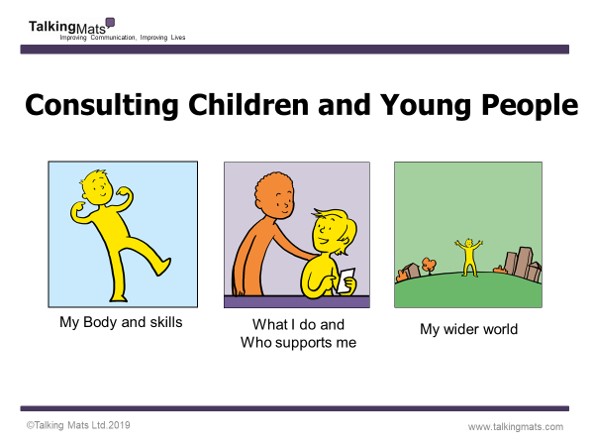This week’s guest blog, the first of 2 from the authors (Lois Cameron, Nikky Steiner and Luccia Tullio), describes the development process of a set of symbols aimed at supporting practitioners to reflect on the role of identity within their practice.
Every person has their own unique identity, just like they have their own unique fingerprint.
Identity is about how we see ourselves and how the world sees us.
Background
The Royal College of Speech and Language conference 2021 was titled ‘breaking barriers and building better.’ Professor Harsha Kathard from the University of Cape Town gave the keynote presentation and reflected on the key role understanding identity has in clinical practise, stating that ‘understanding identity is key to inclusion’. Secondly, she stressed that if we want to develop better services and support then ‘Turning the gaze to reflect on our positionality is central to change’ .Ash R et al (2023) in their editorial for the British Medical Journal highlight how interventions normally focus on single categories of social identity and ‘fail to account for the combinations of, or intersections between, the multiple social characteristic that define an individual’s place in society.’ They argue that ‘systems of care may consequently overlook overlapping systems of discrimination and disadvantage and exacerbate and conceal health inequities.’
The Development group
Following feedback from clinicians and people who use Alternative and Augmentative Communication (AAC) a working group was formed in March 2021 to explore the role of identity, diversity, equality and inclusion with in AAC practice.
Communication Matters and AAC networks within the UK advertised the group and 12 people responded. These people came from a range of organisations and had a range of lived experiences of diversity including people who use a communication aid to help them communicate. The work was funded by the Central London Community Health Trust and Talking Mats Ltd facilitated the meetings and the work
The group worked shaped the resource by reaching a consensus about the components of life that contributed to identity. In the end the group agreed on gender, sexuality, disability, race, neurodiversity, culture, family structure, voice, bilingualism, religion, mental health, personality, politics, intimacy, connecting with others and occupation. The process of developing the symbols was hugely helpful in unpicking what was actually meant by the various aspects e.g. voice. The original image for voice represented accents but the group discussion shaped the image to represent much more so the final image included a rainbow flag, a more general sound wave to represent tone, a Spanish word and an image to represent disability. As one group member said ‘my cerebral palsy is part of my identity. If I am having a voice I want to reflect that identity – I want a cerebral palsy voice’. Identity and the issues surrounding it can be emotive but the focus on the symbols helped contain the emotion and supported group members to listen to the perspective of others.
The whole iterative process of developing the resource and clarifying what the symbols should look like allowed the group to be clear about the individual meanings of abstract topics. This wider understanding was captured in a glossary to go alongside the symbols. For example, Identity has the following definition: Every person has their own unique identity, just like they have their own unique fingerprint. Lots of different characteristics make up our identity. This is what makes us different from other people. Sometimes we may share some of these characteristics with other groups of people, which can also be part of our identity. Identity is about how we see ourselves and how the world sees us.
Equality, Diversity and Inclusion: a visual framework to support the exploration of Identity within practice.
The resource is seen as a support for constructive reflection by practitioners on identity and allows them to consider the different aspects of their patients’ lives that may impact on their interventions. The final Talking Mats symbols have the suggested top scale of ‘I considered a lot’, ‘I considered a bit’, ‘I have not considered yet ‘. It could be used individually or by a team as a group discussion tool.
As the resource uses the Talking Mats framework, it is recommended that practitioners have completed their Talking Mats foundation level training
If you are interested in completing Talking Mats Foundation Training, you can see the training options in our shop here.
References
Kashard H 2021 Keynote breaking barriers and building better The Royal College of Speech and Language conference.
Ash Routen, 1 Helen-Maria Lekas, 2 Julian Harrison, 3 Kamlesh Khunti1,2023 Interesectionality in health equity research BMJ 2003 https://www.bmj.com/content/383/bmj.p2953
Talking Mats is delighted to welcome a new Training Associate, Jess Lane. Jess has written this blog to introduce herself to the Talking Mats community. Welcome, Jess, we’re thrilled to have you as part of team TM!
Hello! My name is Jess and I am thrilled to be introducing myself as a newly appointed Training Associate for Talking Mats.
About Me
I am a Specialist Speech and Language Therapist with a clinical background in Learning Disabilities and Paediatric Mental Health. I also work for the Royal College of Speech and Language Therapists (RCSLT) as a Research and Outcomes Officer, where I help to build research capacity, capability and culture within the profession. I am currently studying towards a Clinical Doctorate in Professional Health Studies, looking at the use of Talking Mats for facilitating the direct and meaningful involvement of children in care planning.
Talking Mats has been a huge part of my career to date. This began in my hometown of Gloucester, where I worked as an SLT in an Intensive Support Service for children and adults with learning disabilities. Changes in my personal circumstances saw me relocate to Scotland in 2022, where I worked across Specialist Child and Adolescent Mental Health (CAMHS) Services in and around Glasgow. Most recently, I worked at a National Child Inpatient Psychiatric Unit (CIPU), supporting children with severe and enduring mental illnesses.
Talking Mats in CAMHS
Since completing my Licenced Training last year, I have been working with Talking Mats to deliver Foundation Training for CAMHS teams across the UK, as well as driving an upskilling initiative for Specialist Children’s Services locally in Glasgow. I have found that Talking Mats provides children with a safe space to explore topics that they might otherwise feel unable to communicate about, in a way that is highly supportive, sensitive and impactful. This is encompassed by feedback from a recent patient, who wanted to share that “using a Talking Mat is easier than talking because talking about how you feel can be difficult”.
Many of the children admitted to CIPU present with transient communication difficulties that can exacerbate the impact of mental ill health. Some children present with underlying communication difficulties that were not apparent in the community setting. Other children do not present with communication difficulties, but find it extremely difficult to think about, or share their views on, sensitive topics. Because of this, Talking Mats have been used extensively by the multidisciplinary team on CIPU to:
- Facilitate the direct involvement of patients in goal setting and care planning
- Adapt and extend traditional mental health inventions, including talking therapies
- Support capacity assessments, assessments of mental state and medication reviews
- Improve engagement with local advocacy services as part of the CTO process
- Adapt and extend assessments such as the Child Occupational Self-Assessment Tool
- Improve access to psychoeducation for patients with anxiety and/or depression
- Improve engagement with meal planning for patients with an eating disorder
- Support the differential diagnosis process for mental illnesses such as catatonia

Using Talking Mats in an acute mental health setting has transformed the way clinicians from across Nursing, Psychiatry, Dietetics, Occupational Therapy, Physiotherapy and Psychology engage with the children about their care and treatment. Feedback from the clinical team, children and their parents/carers has been overwhelmingly positive. Talking Mats are now used routinely on the unit to support children’s access to (and engagement with) therapeutic intervention as part of their wider recovery, as well as ahead of all multidisciplinary team meetings and case conferences to ensure each child’s voice is heard and acted upon.
I am so pleased to have joined the Talking Mats team and am very much looking forward to supporting other people to use Talking Mats in a range of settings. Stay tuned for a follow up blog on how I have used Talking Mats as part of a post-diagnostic package of support for autistic children and young people, designed to support more focussed, strengths-based conversations around what it means to be autistic, in line with the core principles of neurodiversity affirming practice.
Manchester 30th June 2022.
It has been a long time since our Associates have been able to deliver training in a venue that is not virtual (to be accurate usually their kitchen / bedroom / garden shed). We are really pleased, therefore, to be able to let you all know that face to face training has returned! We know the convenience of online suits some people but many of you have been really missing the interaction, the energy and the discussion that occurs in a face to face training and we are looking forward to getting back to working with you in the same room.
It will be held in the St. Thomas Centre, Manchester on the 30th of June from 9.30am until 4.30pm. Find out more about what to expect on this course by following this link Manchester June 2022.
Talking Mats will take every step required to keep all participants and staff safe in this situation. Please let us know if there is anything we can do to support you to attend this course.
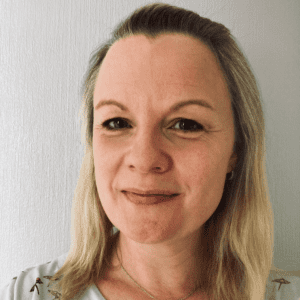
This course will be run by Laura Holmes, Lead Associate with responsibility for Foundation Training. She has been training with us since 2016. Here are her thoughts on resuming face to face training;‘I get so much out of face to face training; particpants form relationships quickly and really respond to each other and it creates a special learning environment.’
There are only 12 places on this course and we expect them to be taken up quickly.
To book please follow this link BOOK HERE.
The Talking Mats Foundation Training is a course that builds people’s confidence in using and applying Talking Mats to their work. Organisations can access this as a group ensuring staff can embed the Talking Mats approach and principles into their practice. The training also gives staff a common language for embedding a patient centred approach at the heart of a service.
We offer online training by;
- giving organisations access to our online training platform – this is designed as self-directed course, supported by a Talking Mats tutor, with a variety of activities and resources to support learning
- zoom/teams sessions
- a combination of both 1 and 2.
2020 saw an increase in organisations approaching Talking Mats for online team training and this has continued into 2021. We will work with you to find the approach that best suits your staff group.
Online learning does not suit everyone and comments from participants are mixed. Some really like the flexibility of being able to work at their own pace and find the site user friendly whilst others miss the interaction that face-to-face brings. As a team we miss the face-to-face training too but believe that our online training and the support we offer organisations is an excellent alternative.
It is easier to discuss the impact of an organisational course by giving an example. We recently ran a course using our online learning platform combined with short introductory and a follow-up session on Zoom for 24 staff working in an NHS Paediatric service. Taking part on the course were Nurses, Psychologists, Occupational Therapists, Physiotherapists, Dieticians and Speech and Language Therapists. It was great working with such a multidisciplinary group. They all have communication at the heart of their practice and were keen to learn about a framework that could help them improve the effectiveness of their work. There were different reasons for doing the course, but a common theme was wanting to have more ways of directly engaging and building relationships with the children they were working with rather than relying mostly on carer views. They wanted to be able to involve young people more meaningfully in some of the complex issues that surrounded their care.
It is always positive when a course has immediate impact and this staff group applied their learning in very different ways, for example Talking Mats was used to;
- communicate with a young person with selective mutism,
- involve a young woman who was self-harming to contribute to the strategies that help her reduce those behaviours ,
- involve children in physiotherapy interventions.
One course participant said ‘I have practised with a couple of patients and it has made a massive impact on their lives already. One patient’s behaviours have dramatically reduced as I was able to support her to show how she felt about aspects of her care and resolve this.’ And another participant said ‘I have now used Talking Mats with a couple of young people with complex neurodevelopmental difficulties and this has helped engagement considerably, where things had felt stuck before’
An important part of Talking Mats training is to help participants think about their own communication style and how it impacts on interactions and relationships. Staff said;
- this course increased my awareness of my communication style and made me reflect more on how I communicate with my patients but also what I presume from my patients.
- I am more aware of the communication demands I place on others as a clinician/therapist and am more confident in engaging people with communication difficulties.
- It has made me think more about the language that i use during interactions.
- It has definitely made me reflect on my own style of questioning, and helped improve my pacing and language skills.
The feedback from this varied and engaged group of staff was positive and is summed up in this comment; ‘The course was very engaging, interesting, and easy to follow and understand. I have learned a lot from this. The reflective work throughout the modules really helped to connect the theory with the practice of Talking Mats. The course leaders were very involved, supportive and helpful!’
Our training is relevant to organisations working within Social Work, Advocacy, Dementia Support and Education as well as Health and Social Care. If you think you would like to organise a course for your staff group please get in touch at info@talkingmats.com to talk it through.
Many thanks to Edith Barrowcliffe from The Action Group for sharing her experiences of using Talking Mats to support counselling with adults who have cognitive or communication difficulties. Watch this space for Edith’s follow-up blog next week which will describe how she has continued to use Talking Mats during lockdown. Please note that the image used in this blog is from a mock session and has been taken for publicity purposes only.
Eleven years ago, I began working at The Action Group with adults who have additional support needs and was struck by how many had mental health difficulties that they were getting little help with. Sadly, with services scarce enough for the “mainstream” population, I could see why.
The issue resurfaced for me in 2016 when I began training as a counsellor. I kept returning to whether talking therapy was possible with those who had difficulty communicating – or even thinking about – their feelings.
Then in 2019, I attended Talking Mats training. Immediately excited by the potential for emotional connection, I signed up for the advanced “Keeping Safe” training and approached The Action Group’s CEO with the beginnings of a plan.
I’m fortunate in working for an organisation willing to take new ideas and run with them. Within six months I was embarking on a pilot project, called HearMe, offering counselling to adults with cognitive or communication difficulties, with Talking Mats as a key method to help overcome those barriers. Within a fortnight of opening the service was full to its limited capacity and had a waiting list!
The work has been experimental, learning as I go and adapting to the particular needs of each client. To conduct initial assessments, I’ve assembled symbols based on “Thoughts and Feelings” from the “Keeping Safe” pack. We return to this to review progress. Most clients have used a top scale of “True”/ ”Not True” with statements “about me” for the assessment. We always begin with a practice mat based on more neutral material, allowing the client (Thinker) to learn what’s involved and me to gauge whether the mat is right for them. This is crucial – one client found a way to frame everything we placed on the mat positively even when they’d been able to tell me the opposite was true a moment before! In this case we simply used each symbol as a focus for exploration.
We’ve kept the number of questions relatively small, but the assessment can take two or three sessions to complete as clients often respond quite deeply to the symbols.
Some more verbally able clients move on to a more “freeform” style of counselling as we progress, relying less on the mat to open up. But even in these cases having symbols on hand can be helpful. One client brought up the topic of sex – then apologised and asked if it was OK to talk about it.
“It’s fine,” I was able to reassure her, producing the relevant symbol. “Look, we even have a picture for it”. She laughed and visibly relaxed, the card giving her tangible evidence that the topic was allowed.
It’s still early days, but from the feedback we’ve received so far, the project really seems to be helping people to open up, express feelings they’ve never given space to before, and explore ways they want to change their lives. The power of simply being heard.
Edith Barrowcliffe, Hear Me, The Action Group
With thanks to our funders and partners for making this work possible – Hospital Saturday Fund, The Action Group Board, Leith Benevolent Society, Port o’Leith Housing Association, and The Scottish Government. And to the team at Talking Mats for their support and help!
Follow the link below to find out more about our Keeping Safe training (now available online) and resource:
https://www.talkingmats.com/keeping-safe-a-new-talking-mats-resource-available-to-purchase/
As a group of Allied Health Professionals (AHPs) working in a secure hospital we recently embarked on a mini project using Talking Mats to check in with our service users with learning disabilities during Covid-19. We collated the evidence from our respective professional bodies (Royal College of Occupational Therapy, Royal College of Speech and Language Therapy, Chartered Society of Physiotherapists and British Dietetic Association) in terms of changes that people might experience if they’d had Covid-19 and produced a talking mat around these.
It quickly dawned on us that we might be on to something here, and that creating an opportunity to ‘check in’ more broadly with our service users would serve a useful purpose, so we added some additional categories around changes to routine, psychological wellbeing and feeling safe.
This was my colleagues’ first experience of using talking mats, and their faces when I turned up clutching my 99p actual doormat were a picture! I introduced them to the theory behind the mat and its presentation and harped on about the benefits in terms of attention, comprehension, non-threatening interaction, initiation and structuring narrative; they nodded supportively.
We set off across our learning disability wards in multi-disciplinary pairs and all but a few of the service users agreed to have a chat with us. My colleagues commented that they were pleasantly surprised by the engagement and the amount and novelty of the information gained; we identified things that the service users hadn’t told anyone because they hadn’t been asked that question!
In talking to others we were asked why weren’t rolling this out in a partner secure hospital for people with mental health conditions? ‘no reason really, we just haven’t got there yet’ we answered. Then came the…. but we can just do it like a questionnaire with them. This question wasn’t, and in my experience isn’t ever ill meant. It comes from a place of naivety in relation to the presence of communication difficulties in people with mental health conditions and because of that, lack of exposure to different professional groups such as Speech and Language Therapy and the skills and approaches we have to offer. Skills in gaining and holding someone’s attention. Skills in decreasing pressure in communication situations. Skills in enabling time, space and ways in which people can initiate their thoughts.
The Multi-Disciplinary Team (MDT) working around the project has enabled me to show others how talking mats can support their practice. It has enabled them to see how a very simple and non-threatening visual tool can open up conversations and lead to information that the service users hadn’t shared before, in a way that a face to face conversation doesn’t.
Thanks to Jo Brackley, Clinical Lead, Speech and Language Therapy Secure Services at Cumbria, Northumberland Tyne and Wear NHS Foundation Trust for this inspiring blog – which demonstrates when we shift the way we listen and gather information from patients we get a different result and improve the quality of information and communication . If you or your team want to consider Talking Mats training then we can provide this for organisations . At the moment we can take a cohort through our online course together and then arrange a zoom call to discuss application to your work setting – email info@talkingmats.com for more information.
The current situation is strange for everyone so please read about our online training offer*. Whilst normal work practices are put on hold, the need and desire to keep our minds challenged in order to provide the best care possible for our clients and families is still there – perhaps more so! Our online learning course provides a stay at home option that will:
- Allow you to understand the Talking Mats evidence-based approach to communication and thinking;
- Help you apply a creative approach to conversations and interviews within your setting. This could be for goal setting, staff appraisals, service evaluation;
- Help you gain confidence in using a tool that embodies a person-centred approach to communication and increases awareness of your own communication style;
- Let you study in your pyjamas with the cat on your lap.
*Please note this offer has now finished but you can still book a place on one of our online courses.
The course runs for 6 weeks with 4 modules to complete that are fully supported by a Talking Mats Associate who provides individual feedback.
Here is what previous students had to say about their online learning experience:
“I found it helpful to be able to go through the training at my own pace and spread it out across 5 weeks. This gave me time to reflect on what I had learnt and consolidate my learning.”
“I liked that I could access the training at any time and was able to review bits that I was unsure of – overall a positive experience. Thank you.”
“I liked that the online course could be taken at my own pace as having four children and found I had frequent interruptions. The layout was easy to navigate and I found the forum section a helpful read.”
And the impact it has had on them personally:
“From this training, I learned to adjust my communication styles to support my communication partner’s engagement in a conversation.”
“This training has improved my confidence and skills when supporting clients to think and express their opinions and has improved my knowledge about the different benefits of Talking Mats that I had not previously considered, e.g. as a thinking tool.”
Upcoming start dates: 22nd September, 6th October and 3rd November.
To register interest, please complete the registration form and email it to info@talkingmats.com
Remember you can use Talking Mats remotely and there is a Digital Talking Mats Covid19 offer.
It’s always great to see pictures of Talking Mats on social media. The stories behind them, and the positive changes that can result for people keeps us motivated to share this powerful tool.
It is apparent however that not all pictures that are called Talking Mats are actually Talking Mats! For example,
TOP SCALES If the top scale is Yes / No Or a tick /cross
It is apparent from these mats that the questions are likely to be closed, and don’t provide a scale for reflection. Closed questions can be leading and suggestive of a set answer the listener is seeking. e.g ‘Did you enjoy your lunch?’ v. ‘How was your lunch?’
A yes/no, or a tick and cross at the top are occasionally used with topics which appear to test understanding of rules, e.g acceptable and unacceptable behaviour in a classroom. In that instance the listener facilitating the mat keeps the control and the power imbalance that exists in conversations for people with communication difficulties isn’t reduced.
The top scale used with each topic is key to the mat working. A Talking Mat could find out what the person thinks about the rules, and which ones they feel are good -not good or help -not help. Our Foundation training includes how to match the top scale to the conversation. https://www.talkingmats.com/training/
TEACHING TALKING MATS Some people with communication difficulties need to learn how to do Talking Mats. Learning how to express a view can take time and has to be taught. We see pictures of what appear to be Teaching Mats. For example, starting with closed questions might be necessary to introduce the idea of preferences.
It is important that these Teaching Mats are not used as a true representation of a person’s view but seen as a step towards this skill- It can take time but great learning takes place along the way.
We have guidelines for working towards Talking Mats on our website:
Guidelines for working towards using Talking Mats – These guidelines are designed to support Talking Mats trained practitioners working with thinkers who may need to take extra steps to work towards using the Talking Mats framework
Supporting people to share what they think, and giving them the control to say when they are not happy with an aspect of their life, is within their legal rights.
‘To deny people their human rights is to challenge their very humanity’ Nelson Mandela
In the second of two blogs, we talk about how using Talking Mats Resources can help people have better conversations.
Our first Resources blog (https://www.talkingmats.com/resources-with-training/) focused on the resource bundles which are available to purchase with our Foundation Training course. This second blog focuses on the resources which are available to people who have completed our Foundation Training course.
Remember that most of our resources are available in both low-tech, and digital, formats.
Post-Training
Once you have accessed one of our Foundation Training courses, you can purchase our resources at a reduced rate:
1. You can buy these in established sets using our post training order form, for example you may choose to buy a social care set, the secondary Children and Young people resource, or one of our Advanced sets (see 3. below). These sets all have 3 topics of conversation in them.
2. New for 2020! – you can now buy individual topics of conversation from our ‘pick and mix’ selection, which includes topics from our Health and Well-being Resource (also available as a bundle purchase with our Foundation Training course), as well as our Conversation Sets:
3. Our advanced sets, for example Keeping Safe and Thinking Ahead, are only available for those who have completed foundation training:
- Keeping Safe: Give people time to reflect on their lives and raise concerns using this resource. This can help you to explore sensitive issues in a non-threatening way by creating a listening space, simplifying abstract ideas, supporting thoughts while encouraging expression and decision making.
- Thinking Ahead: Support people to express their views and help them plan for end of life using this resource. It will also be helpful for many other people to consider future options in their lives.
We are also planning to add a ‘how was school today?‘ topic to our ‘pick and mix’ selection soon – so watch this space!
To find out how our resources could help you in your professional area of work/setting, check out these links here: https://www.talkingmats.com/where-you-work/
For more information about these resources please contact the office on 01786 479511 or email info@talkingmats.com
In the first of two blogs, we talk about how using Talking Mats Resources can help people have better conversations.
Talking Mats provides a visual framework to help people express their views and feelings, using a selection of communication symbols that cover a variety of topics. Talking Mats resources are used by many professionals across a wide range of health, social care, residential, and education settings. Most of our resources are available in both low-tech, and digital, formats. In this first blog we focus on the resource bundles which are available to purchase with our Foundation Training course.
Our resources are available to buy through our website (https://www.talkingmats.com/shop/) however we do strongly recommend completion of one of our Foundation courses (https://www.talkingmats.com/training/foundation-training/) to get the most benefit from Talking Mats – and to use it to its full potential. If you add a Health and Wellbeing, Consulting Children & Young People, or Social Care resource pack bundle to your training you only end up paying £65 for the training day itself which is a great deal!
Resource Bundles available to purchase with Training
Health and Wellbeing Bundle:
These packs are based on the ‘activities and participation’ domains from the WHO ICF framework and includes 9 topics which are relevant to people, regardless of their health, disability or where they live around the world. We have translated these into more ‘user-friendly’ language and have generated symbols to represent each topic.
In addition to the 9 topics from the Activity and Participation domains, we have also included Environment and Health, which are important topics within the ICF framework and in people’s lives.
Consulting Children and Young People Bundle:
These packs are based on ‘Getting It Right For Every Child’ (GIRFEC), a Scottish framework for everyone to use when working with children and young people. There are three broad topics which are relevant to any child or young person’s life. This resource can also be used with SEND reforms in England. There are different packs for each developmental stage: Early years (ages 3 to 7); Primary (ages 7 to 12) and secondary (age 13 upwards).
Best Value Bundle: This option includes the Health and Wellbeing and Consulting Children and Young People bundles above, as well as our Social Care resource packs, providing a complete set of resources to support communication on a comprehensive range of topics for children and adults.
If you’d like to book a place on one of our Foundation Courses and would like to know more about our bundle options, get in touch with us at info@talkingmats.com
Find out more about our Foundation Training course here: https://www.talkingmats.com/training/foundation-training/
 Online training login
Online training login 

